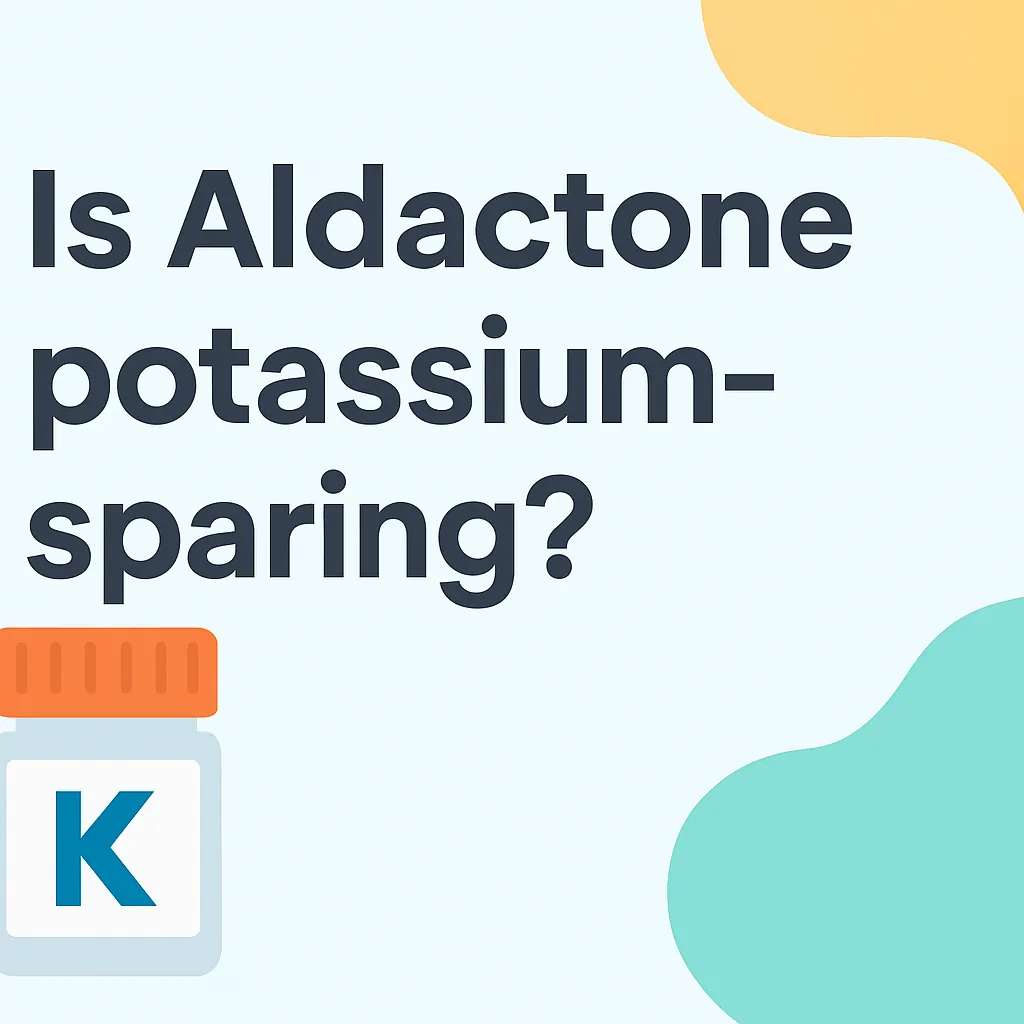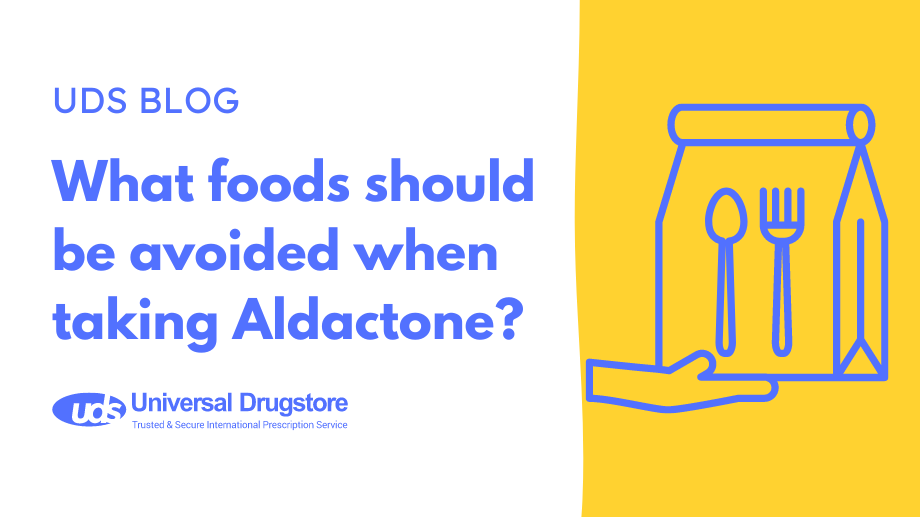Is Aldactone potassium-sparing?

Yes, Aldactone (spironolactone) is a brand-name medication that is considered an aldosterone receptor antagonist and a potassium-sparing diuretic.
Potassium-sparing diuretics refer to drugs that cause increased urination without decreasing potassium levels in your body. They are typically used along with other medications in the management of edema (swelling and fluid retention), high blood pressure (hypertension), cirrhosis, and congestive heart failure.
Potassium-sparing diuretics stop sodium reabsorption in the collecting tubule of your kidney by either binding sodium channels (amiloride, triamterene) or blocking aldosterone receptors (spironolactone, eplerenone). This prevents the loss of potassium in your urine, which prevents hypokalemia (low potassium levels).
What is Aldactone used to treat?
Aldactone is an aldosterone antagonist (blocker) that is approved to treat the following:
- Heart failure
- High blood pressure
- Swelling (ascites) due to liver (hepatic) cirrhosis
- Swelling due to nephrotic syndrome (a rare kidney condition)
- Primary hyperaldosteronism (a condition in which your adrenal gland produces too much hormone called aldosterone)
It is also used off-label to treat polycystic ovary syndrome (PCOS), excessive hair growth in women (hirsutism), and acne in women.
What are the side effects of Aldactone?
Some less serious and common side effects of Aldactone seen in clinical trials include:
- Dizziness
- Headache
- Drowsiness
- Nausea
- Hair loss (alopecia)
- Diarrhea
- Vomiting
- Enlargement of male breasts (gynecomastia)
- Stomach cramps
- Lower sex drive
- Breast pain
- Irregular or lack of menstrual periods
- Sexual dysfunction
- Higher potassium levels
- Leg cramps
- Lower sodium levels
Some people can experience serious side effects while using Aldactone that may require immediate medical attention. If you experience any of the following, contact your healthcare provider or seek assistance at your nearest hospital:
- High potassium levels in your blood (hyperkalemia)Symptoms could include: muscle weakness, a tingling sensation, numbness, trouble catching your breath, racing heart, nausea, chest pain, vomiting.
- Other electrolyte imbalances, including low sodium, calcium, and magnesium in your blood.Symptoms could include fainting, muscle cramps, seizures, and irregular heartbeats.
- Dehydration and kidney problemsSymptoms could include muscle cramps, not urinating as much as usual, nausea, tiredness, vomiting, and swelling.
- Serious allergic reactionsSymptoms could include skin rash, hives, and swelling of the face, lips, and tongue.
These are not all of the possible side effects of Aldactone. You should always seek medical advice from your healthcare provider for any questions or concerns about your medical condition or treatment. Read all patient information, medication guides, or drug information sheets that come with this medication. You can also report adverse effects to the Food and Drug Administration at www.fda.gov/medwatch or call 1-800-FDA-1088.
What drugs interact with Aldactone?
When Aldactone is taken with other prescription drugs, over-the-counter medications, vitamins, and supplements, it may change how they work or increase the frequency or severity of side effects. Make sure that you tell your healthcare professional about anything that you are taking, including:
- Do not use potassium supplements or salt substitutes unless recommended by your healthcare provider
- Medications that may increase potassium: amiloride, cyclosporine, eplerenone
- Cholestyramine
- Digoxin
- Colchicine
- Lithium
- Trimethoprim
- Loperamide
- Heparin or enoxaparin
- ARBs such as losartan and valsartan
- ACE inhibitors such as lisinopril
- Beta-blockers, such as metoprolol succinate
- Other diuretics
- NSAIDs such as ibuprofen, aspirin, and naproxen
Please note that not all possible drug interactions are listed here.
Lab test interactions:
This medication may interfere with certain lab tests (such as digoxin or cortisol levels)
Who should not take Aldactone?
Contraindications are specific health conditions or situations in which you should not take a medication due to safety concerns. If you have any of the following conditions or if any of the following apply to you, let your healthcare provider know because Aldactone may not be safe for you:
Shop Medications
- High potassium levels (hyperkalemia)
- Addison’s disease
- Take Inspra (eplerenone) at the same time
You should use Aldactone with caution if you have:
- Anuria
- Kidney disease
- Electrolyte imbalance
- Fluid imbalances
- Gout
- Liver disease
What dosage form and strengths does Aldactone come in?
Aldactone comes as a film-coated oral tablet. It is available in three strengths: 25 mg, 50 mg, and 100 mg. The dose you take will depend on the condition being treated and your medical history. You can take Aldactone with or without food as a single dose or divided into multiple doses. Be sure to take it exactly as prescribed. Do not change your dose or stop taking Aldactone without discussing it with your healthcare provider first.
Is Aldactone safe to use while pregnant or breastfeeding?
Because Aldactone caused tumors in animal studies, you should avoid using it if you are pregnant unless the benefits outweigh the potential risks to your unborn baby.
An active metabolite of Aldactone appears in breast milk in very small amounts and it is not expected to cause any side effects in your baby. However, if you notice that your baby is not feeding as well as usual, seems unusually tired, or if you have any other concerns, contact your healthcare provider immediately.
Should you avoid potassium on Aldactone?
You should avoid salt substitutes such as No Salt or Nu Salt because they contain potassium. Using these with Aldactone can make your potassium levels too high. Try to limit other foods and drinks that are high in potassium, including bananas, avocados, sweet potatoes, orange juice, tomato juice, spinach, tuna, halibut, lima beans, pinto beans, and nuts.
Does Aldactone cause hyperkalemia?
Yes, Aldactone can cause high potassium levels (hyperkalemia). The risk is increased if you have poor kidney function, are taking potassium supplements, use potassium-containing salt substitutes, or are taking drugs that increase potassium such as ACE inhibitors and angiotensin receptor blockers. Symptoms of hyperkalemia may come and go or can slowly develop over weeks or months. Mild hyperkalemia symptoms include:
- Stomach pain
- Diarrhea
- Nausea and vomiting
Dangerously high potassium levels can affect your heart and cause sudden, life-threatening complications. Severe hyperkalemia symptoms include:
- Chest pain
- Fast-beating, fluttering, or pounding heart
- Muscle weakness or numbness in your limbs
If you develop symptoms of hyperkalemia, seek medical attention right away.
Related Medications
- Zestril (lisinopril)
- Lasix (furosemide)
- Hydrodiuril (hydrochlorothiazide)
- Inspra (eplerenone)
- Cozaar (losartan)
Sources
- Hyperkalemia (High Potassium) American Heart Association. Accessed June 12, 2024.
- Aldactone (spironolactone) tablets for oral use. (2022). United States Food and Drug Administration. Accessed June 12, 2024.
- Spironolactone. DailyMed. Accessed June 12, 2024.
- Spironolactone. StatPearls. Accessed June 12, 2024.





